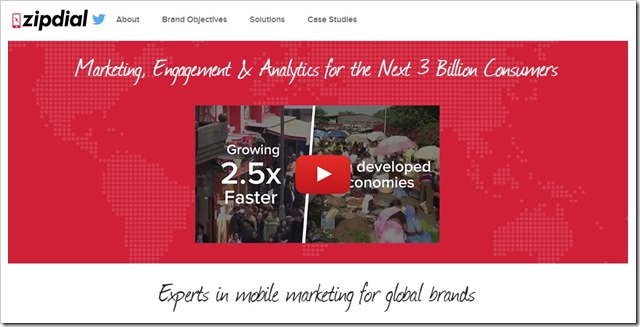Twitter Acquires ZipDial, Their 1st Indian Acquisition! [Updated]
[Updated 20th Jan 2015]
So the rumours (read our previous report below) were true. In an official blog post published by Twitter today, they have conformed acquisition of Bangalore based ZipDial. Here is the Tweet posted by both the companies.
We’ve agreed to acquire @zipdial to make Twitter even more accessible to people around the world. https://t.co/2bs25PB9nW
— Twitter (@twitter) January 20, 2015
ZipDial is a simple missed call service that allows brands and advertisers to connect with offline customers with ease. Twitter in it’s blog post today said, “This acquisition significantly increases our investment in India, one of the countries where we’re seeing great growth, and also brings us a new engineering office in Bangalore.”
[Report filed earlier below]
Unconfirmed reports are coming in, which suggests that Twitter is about to announce its first Indian acquisition: ZipDial. As per our sources, the deal can be anything between $30 and $40 million (Rs 180-240 crore), and speculations are rife that it would be announced later this week.

Although the report also mentions that Facebook is also in talks with them, but considering the business model of ZipDial, it makes more logic for Twitter to get associated with them, rather than Facebook.
January seems to be a lucky month of Indian startups, as last year, around the same time, Facebook had made their first India acquisition when they bought Little Eyes Labs.
ZipDial is a unique startup founded in 2010, which specializes in the mobile marketing and user intelligence niche, the foundation of which is based on missed calls.
The modus operandi is pretty simple, yet absolutely brilliant: Advertisers and marketers are provided a phone number which they can advertise on billboards, newspapers, digital medium and every place where their targeted audience can have a look at. Consumers are asked to give a missed call to that number, following which they can get special offers, news and other information from the advertisers.
In short, consumers can ‘follow’ a brand or a special offer by simply giving a missed call.
Considering that missed calls are a huge phenomenon, both commercially and socially, this idea clicks. The beauty of ZipDial’s business model is that, even those with feature phones can use the facility, and get instantly connected with the brand. As per various estimates, missed call based businesses is currently Rs 500 crore worth market, and Twitter wants to tap this as early as possible.
Why Twitter Should Acquire ZipDial, Not Facebook
Twitter, which is a micro-blogging site, is basically a broadcasting medium with a limited content space. Celebrities and brands who are connected on Twitter can easily broadcast their messages within 140 characters, and it is more effective in mobile based advertisement in India, compared to Facebook.
Phone SMSes are also having limited characters, and in a way, Tweets were inspired from SMSes only. Hence, when a brand or marketer shares short 140 character Tweets, it can be perfectly synchronized as SMSes as well, which ZipDial aims to do ultimately.
Last year, Shahrukh Khan had initiated a campaign in association with ZipDial, wherein fans were asked to give a miss call to a number to connect with him. Once the user gives the missed call, he was able to get all Tweets shared by Shahrukh. And the campaign was a huge hit.
Once this acquisition is finalized, we can see lot more celebrities and brands using such easy, brain-dead advertisement and marketing strategy to connect with millions of phone users, without spending a fortune.
Although Facebook has realized the potential of this feature and have already introduced missed call based campaigns with Gillette, there hasn’t been much action after that. But statistically, more people use Facebook on mobile in India, compared to desktop, and this can be the reason Facebook is also trying to acquire ZipDial.
Stay tuned for the latest update on this exciting development, which can be a big boost for the Indian startup community.
[Source: TechCrunch]
